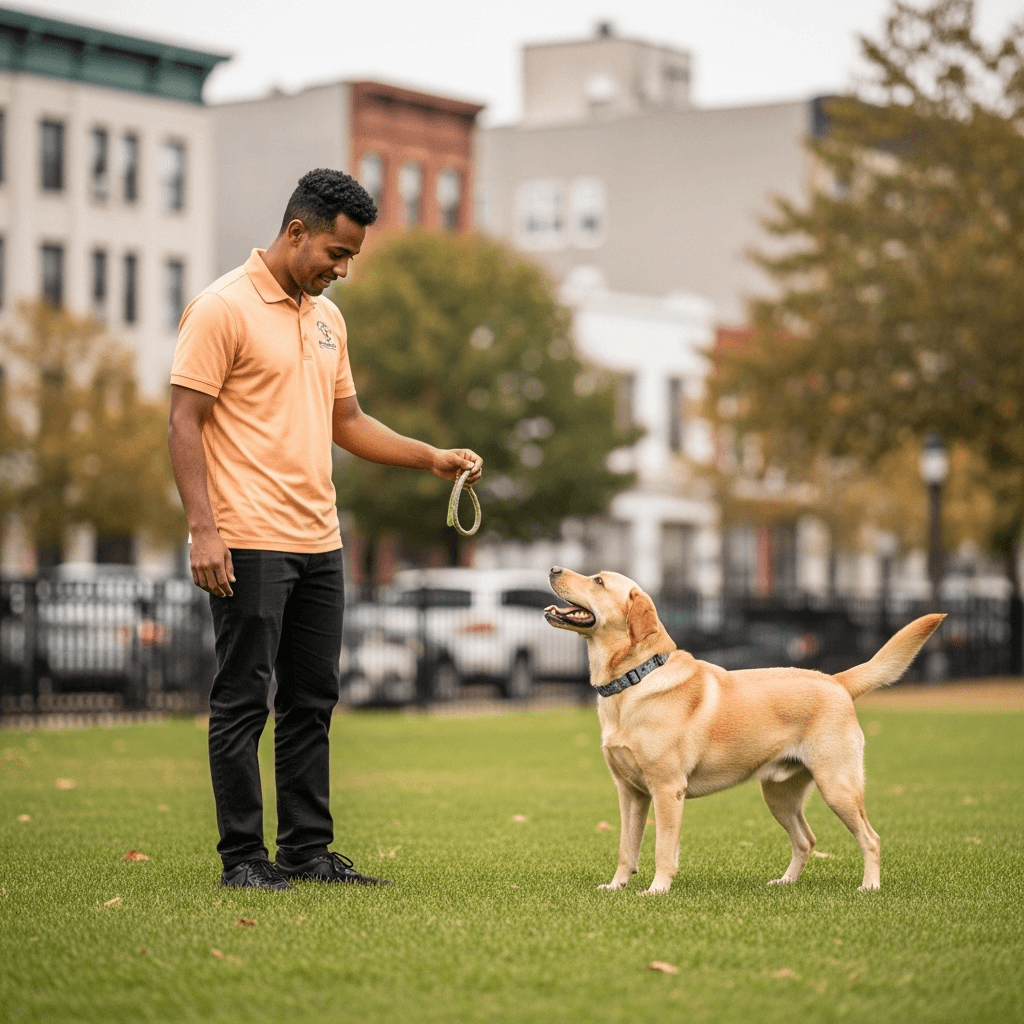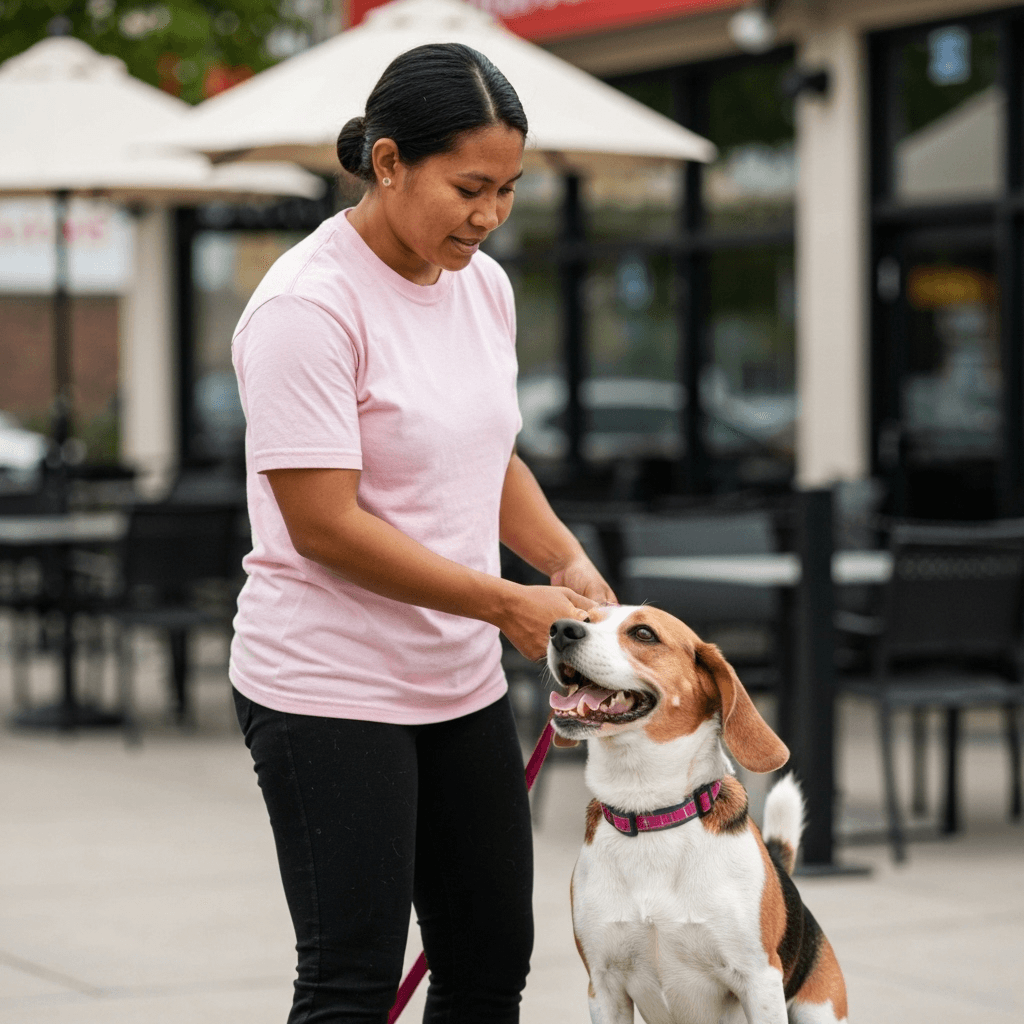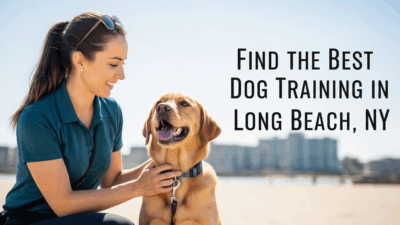Your Complete Guide to Choosing a Dog Trainer in Long Beach and Surrounding Areas
Living with a dog in Long Beach means navigating tight boardwalk crowds during summer, handling busy sidewalks along Park Avenue, and teaching your dog to stay calm near the LIRR station. Your dog needs to walk politely past beachgoers, ignore the temptation of dropped food near restaurants, and handle off-season beach visits without pulling toward the water.
Since Long Beach sits in Nassau County, you’ll follow both city and county ordinances when training your dog. Finding a professional dog trainer who knows these local details helps you get better results whether you’re at home, exploring Kennedy Plaza, or visiting nearby parks.
How to Choose the Right Trainer
Start by looking for someone who uses positive reinforcement training and understands the unique challenges of barrier island living. Your dog needs skills that work in real Long Beach situations like navigating the crowded Superblock area, staying focused near the Recreation Center, and handling encounters with other dogs in tight apartment hallways.
Credentials give you a reliable way to compare trainers’ experience and education. Common dog trainer certifications include KPA-CTP, CPDT-KA, or IAABC-CDBC for more complex behavior problems. If your dog shows serious aggression or fear issues, look for someone with CBCC-KA credentials or a science-based program like CTC.
In-home dog training sessions work perfectly for puppy training basics, door manners when delivery people arrive, and teaching calm behavior in your apartment or house. Group classes make more sense once your dog can focus around distractions, especially before trying busier locations like the boardwalk on weekends.
Common Dog Training Methods Explained

Reward-based methods create lasting behavior changes while building the trust you need for a well-behaved dog in crowded spaces. They also help you follow Nassau County regulations about keeping dogs under control in public.
Basic obedience covers sit, down, stay, place, recall, and leash training so your dog handles sidewalk encounters, outdoor dining areas, and park visits without pulling or jumping on strangers. These skills matter even more in a dense community where you’re constantly passing other people and dogs.
Puppy classes focus on socialization, potty training, bite inhibition, crate training, and early leash manners. Starting with short, positive training sessions prevents problem behaviors before they become habits, which is critical in apartment living.
Behavior modification addresses fear, reactivity, resource guarding, or separation anxiety through careful desensitization and counterconditioning. For serious cases, ask if your trainer collaborates with local veterinarians to rule out medical causes.
Private lessons and in-home sessions let you customize everything around your daily routines, from early morning beach walks to evening strolls past restaurants. Day training can speed up progress when your schedule doesn’t allow for regular training sessions.
Dog training classes help your dog practice good manners around other dogs and people in a controlled setting. The best classes maintain adequate spacing between dogs, screen participants carefully, and teach calm focus rather than just excitement.
Specialized training like therapy dog training or service dog training requires extra structure, public access skills, and a detailed step-by-step training program. These dogs need rock-solid obedience in all environments.
Stay away from any trainer who relies on fear, intimidation, or physical corrections to get results. Humane methods are safer for everyone, easier to maintain long-term, and won’t damage your relationship with your dog.
Average Cost of Dog Training in Long Beach NY and Surrounding Areas (Updated for 2025)
Prices around Long Beach and Nassau County vary based on the trainer’s experience, session length, and whether they travel to your location. Here’s what most local dog owners are paying in 2025.
| Service Type | Average Cost (Long Beach/Nassau County) |
|---|---|
| Puppy classes (4-6 weeks) | $175-$300 total |
| Group obedience classes (4-6 weeks) | $180-$325 total |
| Private lessons (60-90 min) | $125-$225 per session |
| In-home coaching packages (4-6 visits) | $500-$1,100 total |
| Day training (trainer works your dog) | $500-$1,100 per week |
| Behavior consult for reactivity/anxiety | $175-$300 initial session |
| Board and train (2-4 weeks) | $2,500-$5,500 total |
You’ll likely pay additional travel fees if your trainer needs to come from farther areas of Nassau County. Expect higher rates for complex behavior modification work like aggressive dog training or severe separation anxiety.
Make sure you understand exactly what’s included in each package, how the trainer measures progress, and whether they offer a free consultation or free evaluation before you commit to a training program.
Questions to Ask a Potential Dog Trainer
- What training methods do you use, and how do you keep training sessions positive and stress-free?
- What credentials do you hold, like CPDT-KA or KPA-CTP? Do you pursue continuing education such as CPDT-KSA?
- How will you customize your training program for my dog’s specific needs and our Long Beach lifestyle?
- Do you offer in-home sessions, group classes, or day training, and which approach best fits my goals?
- How will we measure my dog’s progress and know when to add more challenging environments?
- What are the total costs, including any travel fees within Nassau County, and what’s your cancellation policy?
- Do you carry liability insurance, and can you provide proof of coverage?
- For behavior problems, will you coordinate with my veterinarian if necessary?
- What should I practice between sessions to help my dog continue improving?
Local Long Beach Rules and Considerations
Long Beach enforces strict leash laws and beach regulations that every dog owner needs to understand. Nassau County also has its own animal control requirements.
Dogs must be leashed at all times on city streets, sidewalks, and in all public parks. The city does not have designated off-leash areas, so plan your training around these restrictions.
Long Beach maintains seasonal beach restrictions for dogs. From May 15 through September 15, dogs are prohibited on the beach and boardwalk between 9 AM and 6 PM. During the off-season, leashed dogs are allowed on the beach but must remain under control at all times.
All dogs in Nassau County must be licensed annually through the Nassau County Department of Health. You’ll need proof of current rabies vaccination to obtain or renew your license.
New York State requires all dogs to be vaccinated against rabies by four months of age. Your veterinarian must provide you with a rabies certificate and tag, which your dog should wear at all times.
Excessive barking can result in noise complaints under city ordinances. Work with your trainer on alert barking and separation anxiety before neighbors file complaints with the city.
New York State does not require dog trainers to hold specific licenses or certifications. However, trainers who board dogs as part of board and train programs may need to follow kennel regulations. Always verify that your trainer carries liability insurance for dog training services.
Local Long Beach Resources for Dog Owners
These nearby locations give you valuable places to practice obedience training, work on socialization, and provide enrichment for your dog. Always follow posted rules and practice good etiquette.
- Magnolia Park in Long Beach offers open grass areas where you can practice leash training and basic commands during quieter times, though dogs must remain leashed.
- Hempstead Lake State Park in West Hempstead welcomes leashed dogs on trails and in picnic areas, providing excellent opportunities to build focus around other park visitors and wildlife.
- Nickerson Beach Park in Lido Beach allows leashed dogs in designated areas during certain seasons, giving you a chance to work on calm behavior near water and crowds.

FAQs
How much does in-home dog training cost?
Most Long Beach trainers charge $125-$225 per in-home visit, with package discounts available when you book multiple sessions. Complex behavior issues typically fall at the higher end of that range.
Is in-home dog training worth it?
Absolutely, because you’re addressing problems exactly where they happen. Your trainer can work on door manners when delivery people knock, counter-surfing in your kitchen, barking at hallway sounds in apartment buildings, and pulling on leash right on your actual block.
Can you pay someone to house train your dog?
Yes, many expert dog trainers offer puppy programs that include potty training schedules, crate routines, and accident prevention strategies. Day training can accelerate the process while teaching you how to maintain consistency.
What is the 3-3-3 rule for dog training?
This helpful guideline for new or adopted dogs suggests about 3 days for your dog to decompress, 3 weeks to learn your routines, and 3 months to feel completely settled. Good training programs work with this natural adjustment period rather than rushing results.
How long will it take to reach my training goals?
Most puppies and friendly adult dogs show solid progress within 4-8 weeks if you practice consistently between sessions. Fear, reactivity, or aggression typically requires several months of careful behavior modification with gradual increases in difficulty level.
What should I bring to group classes?
Pack a flat collar or harness, a 6-foot leash, high-value treats, water for your dog, and current vaccination records if your trainer requests them. Leave retractable leashes at home for safety reasons.
What’s the leash law in Long Beach?
Dogs must be leashed and under control in all public areas throughout Long Beach. There are no designated off-leash dog parks within city limits, so your dog must remain on leash at all times when in public spaces.
Do I need a dog license in Long Beach or Nassau County?
Yes, Nassau County requires all dogs to be licensed annually. You can obtain a license through the Nassau County Department of Health by providing proof of current rabies vaccination.
What shots does my dog need in Nassau County or New York?
New York State requires all dogs to receive rabies vaccination by four months of age and maintain current vaccination throughout their life. Your veterinarian may also recommend distemper-parvo, bordetella, and other vaccines based on your dog’s lifestyle and exposure risks.
Are dog trainers required to be licensed in Long Beach or Nassau County or New York?
No, New York State does not require specific licenses or certifications for dog trainers. Trainers operate as regular businesses, though those offering boarding as part of their services may need to follow kennel regulations. Always verify that your trainer carries liability insurance.
Where can I practice off-leash recall?
Long Beach does not have designated off-leash areas, so you’ll need to travel to nearby communities. Christopher Morley Park in North Hills and Eisenhower Park in East Meadow both offer fenced dog parks where you can safely practice recall and off-leash skills.
Which dog parks allow training around Long Beach?
Long Beach itself does not have dog parks, but nearby options include the fenced dog park at Eisenhower Park in East Meadow and the dog park at Christopher Morley Park in North Hills. Both locations allow off-leash play within their fenced boundaries.
What beaches or trails allow dogs for training?
Long Beach allows leashed dogs on the beach and boardwalk during the off-season (September 16 through May 14) outside of the 9 AM to 6 PM restricted hours. Nickerson Beach Park in nearby Lido Beach permits leashed dogs in certain areas depending on the season. Hempstead Lake State Park offers multiple trails where leashed dogs are welcome year-round.
How do I handle training in an apartment building?
Many Long Beach residents live in apartments or condos, which presents unique training challenges. Work with your trainer on hallway etiquette, elevator manners, and staying quiet when neighbors pass by your door. Practice door greetings so your dog doesn’t bark or jump when you have visitors or receive deliveries.
Can my dog go to outdoor restaurants in Long Beach?
Many Long Beach restaurants with outdoor seating areas welcome well-behaved dogs. Practice calm behavior at home first, then gradually introduce your dog to restaurant patios during quieter times. Your dog should be able to settle on a place command and ignore food smells and passing pedestrians.
The right combination of patient training for dogs, positive methods, and consistent practice around Long Beach’s unique environment will help your dog become a confident, well-mannered companion. Whether you’re walking past summer crowds or enjoying quiet winter beach visits, investing in quality dog obedience training pays off every single day.
